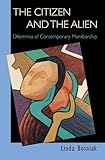The Citizen and the Alien : Dilemmas of Contemporary Membership / Linda Bosniak.
Material type: TextPublisher: Princeton, NJ : Princeton University Press, [2008]Copyright date: ©2006Edition: Course BookDescription: 1 online resource (248 p.)Content type:
TextPublisher: Princeton, NJ : Princeton University Press, [2008]Copyright date: ©2006Edition: Course BookDescription: 1 online resource (248 p.)Content type: - 9780691138282
- 9781400827510
- 323.6 22
- K3224.B67 2008
- online - DeGruyter
- Issued also in print.
| Item type | Current library | Call number | URL | Status | Notes | Barcode | |
|---|---|---|---|---|---|---|---|
 eBook
eBook
|
Biblioteca "Angelicum" Pont. Univ. S.Tommaso d'Aquino Nuvola online | online - DeGruyter (Browse shelf(Opens below)) | Online access | Not for loan (Accesso limitato) | Accesso per gli utenti autorizzati / Access for authorized users | (dgr)9781400827510 |
Browsing Biblioteca "Angelicum" Pont. Univ. S.Tommaso d'Aquino shelves, Shelving location: Nuvola online Close shelf browser (Hides shelf browser)

|

|

|

|

|

|

|
||
| online - DeGruyter Pessimism : Philosophy, Ethic, Spirit / | online - DeGruyter Journeys to the Other Shore : Muslim and Western Travelers in Search of Knowledge / | online - DeGruyter The Politics of Life Itself : Biomedicine, Power, and Subjectivity in the Twenty-First Century / | online - DeGruyter The Citizen and the Alien : Dilemmas of Contemporary Membership / | online - DeGruyter Religion and the Constitution, Volume 1 : Free Exercise and Fairness / | online - DeGruyter Living Speech : Resisting the Empire of Force / | online - DeGruyter Judges and Their Audiences : A Perspective on Judicial Behavior / |
Frontmatter -- Contents -- Acknowledgments -- CHAPTER 1. Divided Citizenships -- CHAPTER 2. Defining Citizenship: Substance, Locations, and Subjects -- CHAPTER 3. The Difference That Alienage Makes -- CHAPTER 4. Constitutional Citizenship through the Prism of Alienage -- CHAPTER 5. Borders, Domestic Work, and the Ambiguities of Citizenship -- CHAPTER 6. Separate Spheres Citizenship and Its Conundrums -- Notes -- Index
restricted access online access with authorization star
http://purl.org/coar/access_right/c_16ec
Citizenship presents two faces. Within a political community it stands for inclusion and universalism, but to outsiders, citizenship means exclusion. Because these aspects of citizenship appear spatially and jurisdictionally separate, they are usually regarded as complementary. In fact, the inclusionary and exclusionary dimensions of citizenship dramatically collide within the territory of the nation-state, creating multiple contradictions when it comes to the class of people the law calls aliens--transnational migrants with a status short of full citizenship. Examining alienage and alienage law in all of its complexities, The Citizen and the Alien explores the dilemmas of inclusion and exclusion inherent in the practices and institutions of citizenship in liberal democratic societies, especially the United States. In doing so, it offers an important new perspective on the changing meaning of citizenship in a world of highly porous borders and increasing transmigration. As a particular form of noncitizenship, alienage represents a powerful lens through which to examine the meaning of citizenship itself, argues Linda Bosniak. She uses alienage to examine the promises and limits of the "equal citizenship" ideal that animates many constitutional democracies. In the process, she shows how core features of globalization serve to shape the structure of legal and social relationships at the very heart of national societies.
Issued also in print.
Mode of access: Internet via World Wide Web.
In English.
Description based on online resource; title from PDF title page (publisher's Web site, viewed 30. Aug 2021)


